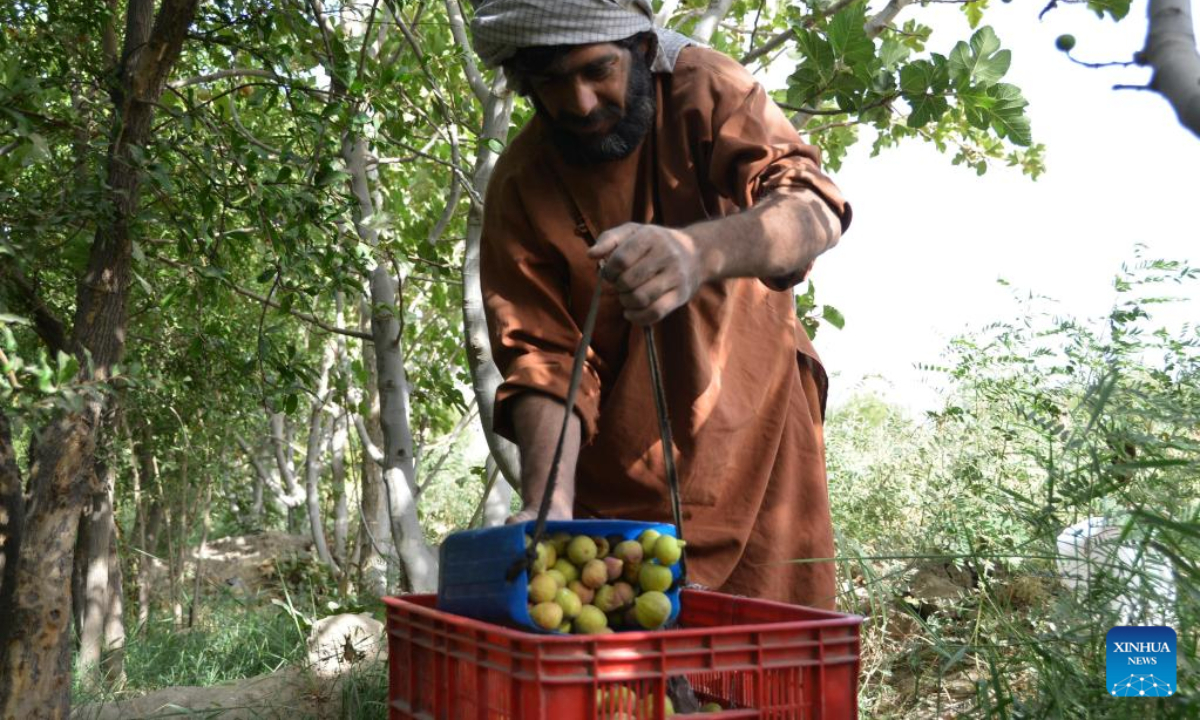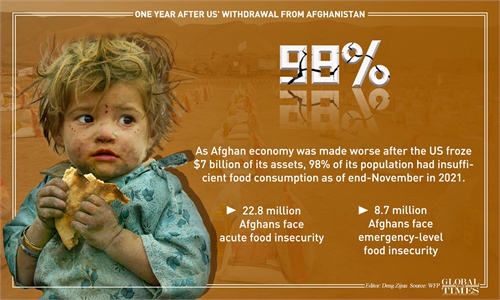China and Afghanistan ramping up cooperation in agriculture and mining, 1 year after US troop pullout

An Afghan farmer harvests figs in Kandahar province, Afghanistan, July 21, 2022. Photo:Xinhua
China and Afghanistan can strengthen cooperation in agriculture and mining, where they are complementary in terms of technical advantages and resources, experts said, extending prospects for deepened cooperation on the one-year anniversary of the Taliban government.
One year since US troop withdrawal in August 2021, leaving behind a war-torn nation with many things yet to be developed, Afghanistan has seen new momentum for growth, with neighboring countries including China playing an increasingly important role in helping the country to grow its economy and improve Afghans' livelihood, experts said.
From the "pine nut air corridor," established jointly by China and Afghanistan, which resumed trade flows benefiting Afghan farmers, to providing humanitarian aid such as food and winter supplies to help Afghanistan's homeless people, as well as other investment and cooperative projects offered by Chinese business groups, the frequent and fruitful connectivity between the two governments and peoples throughout the year exemplified how pragmatic and non-conditional cooperation has brought about tangible results for the peaceful rebuilding of a war-ravaged country, experts said.
Yan Wei, professor with the Institute of Middle Eastern Studies of Northeast University, told the Global Times on Tuesday that trade and mining are the two major sectors that have potential to unleash trade between the two neighboring countries.
One significant milestone of economic and trade relations between China and Afghanistan was the opening of the "pine nut air corridor," which reflects an important bond of friendship between the two countries as Wang Yu, Chinese Ambassador to Afghanistan, said.
Pine nuts are the only source of income for many Afghan farmers, and the sector affects the livelihoods of thousands of Afghans. As of December last year, 1,170 tons of pine nuts had come to China on 26 chartered pine nut planes, generating more than 100 million yuan ($16 million) for the Afghan people.
"There is a possibility for more Afghan goods to come to China…goods such as meat and fruit from Afghanistan all have great potential in boosting trade flows between the two countries," Yan said.
Talks over mining project cooperation are also taking place. Just a month ago, an Afghan government official from the mining sector met with the representative of Chinese mining company Metallurgical Group Corp, the company that owns the Aynak copper project, during which both sides talked about the latest developments, and technical, financial and land acquisition issues regarding the Aynak project, according to the ministry.
While the project was put on hold due to regional instability and some other issues, experts believe that there is great potential that the cooperation could offer once the conditions met, given that "Afghanistan is rich in high-quality copper ore and other raw materials while China's technology and infrastructure capability enables these materials to be well exploited," Yan said. These raw materials are also important resources for industry supply chains.
The mine, which is believed to be the world's second-largest, has an estimated deposit of 5.5 million metric tons of high-quality copper ore, media reported.
August is a special month not only for the Afghan people but also for Li Xijing, deputy general manager of Chinatown in Kabul.
In a memorandum to mark the one-year anniversary since the Taliban government came to office that Li wrote and sent to the Global Times on Tuesday, he reviewed the new opportunities that the country and its connectivity with China can offer to local businesses and improving livelihood.
With great expectations for the country's future development, the Chinatown signed in April a deal with the new Afghan government about building an industry park in Kabul.
"This project should be the first infrastructure construction project signed by the new Afghan government and a Chinese company, creating a model for Chinese companies to enter Afghanistan and participate in the reconstruction process," Li said.
The industrial park is expected to cost $216 million and will include 150 factories, providing permanent employment for 13,600 Afghans and indirect employment for another 30,000, according to Li.
The fruitful cooperation came after the frequent high-level meetings and interactions that have laid a political foundation and trust between the two sides, experts said.
From August 9 to 11, Yue Xiaoyong, special envoy for Afghanistan Affairs of the Ministry of Foreign Affairs, visited Afghanistan, stressing that China will continue to work with Afghanistan's neighbors, regional countries and the international community to support Afghanistan in addressing humanitarian challenges, help the Afghan people overcome difficulties, and support the country's peace reconstruction process.
The two sides agreed that the US should bear the main responsibility for the current dilemma in Afghanistan while urging the US to immediately return all assets belonging to the Afghan people, lift unilateral sanctions and unreasonable restrictions on Afghanistan, and earnestly fulfill its primary responsibility for the peaceful reconstruction of Afghanistan.
Yue's visit further implements the results of State Councilor and Foreign Minister Wang Yi's visit to the country in March and the third Foreign Ministers' Meeting among the Neighboring Countries of Afghanistan held in Tunxi, Anhui Province in March, as part of the Chinese government's efforts to prompt the international community to continue to maintain a high degree of attention to Afghanistan.



